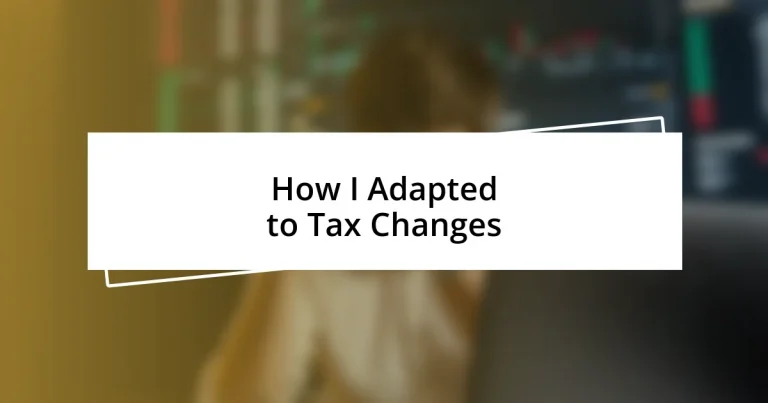Key takeaways:
- Understanding recent tax changes involves proactively analyzing personal financial impacts, such as income adjustments and available deductions.
- Utilizing available tax resources, including online tools and local community assistance, can simplify navigating tax obligations and uncover potential savings.
- Adopting a positive mindset towards taxes can transform the experience from stressful to empowering, turning uncertainties into opportunities for financial growth.
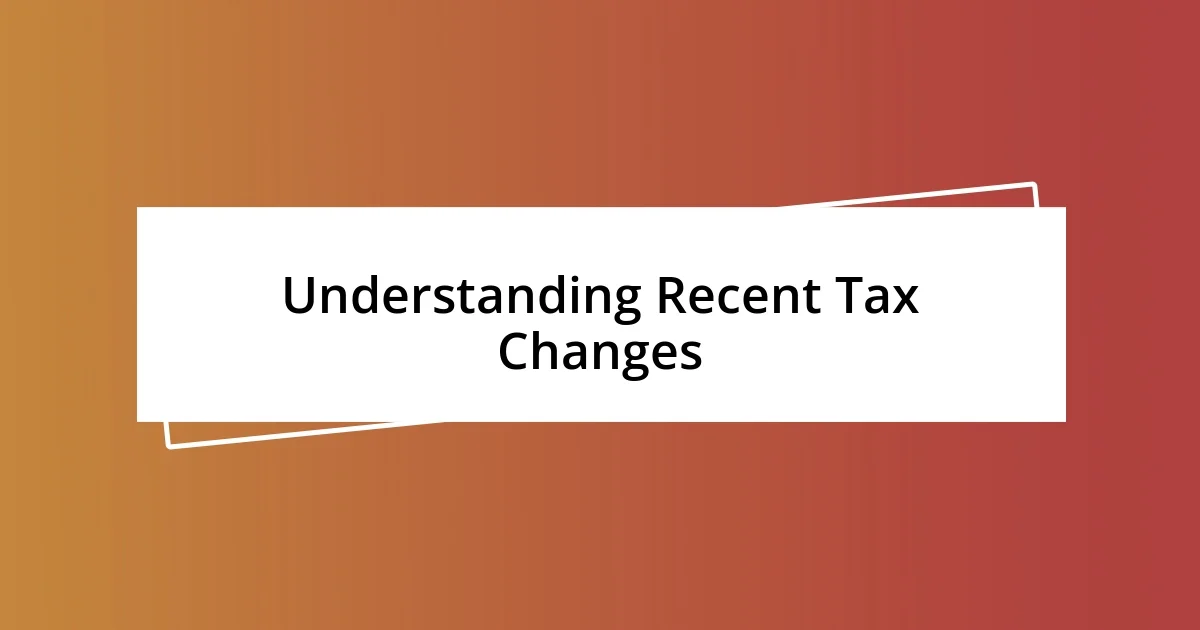
Understanding Recent Tax Changes
Tax changes can feel overwhelming, can’t they? I remember the first time I sat down with the new tax code, and it felt like deciphering a secret language. Each adjustment seemed to bring its own set of questions about how my finances would change. The emotional weight of uncertainty crept in—would I owe more this year?
Analyzing the specifics of recent adjustments, I found that understanding the changes wasn’t just about crunching numbers. For instance, the increase in standard deductions allowed me to reconsider my financial planning, shifting some of my expenses toward avenues that would yield better returns. This revelation sparked a mix of excitement and relief; I finally felt like I had some control over the situation.
As I navigated these updates, I also thought about how they impact not just my life, but everyone around me. I asked myself, how are my friends and family adapting to these changes? The conversations we had revealed a collective confusion but also a determination to tackle the new rules together. It was comforting to know I wasn’t alone in this journey, and sharing our experiences helped to lighten the burden of understanding tax changes.
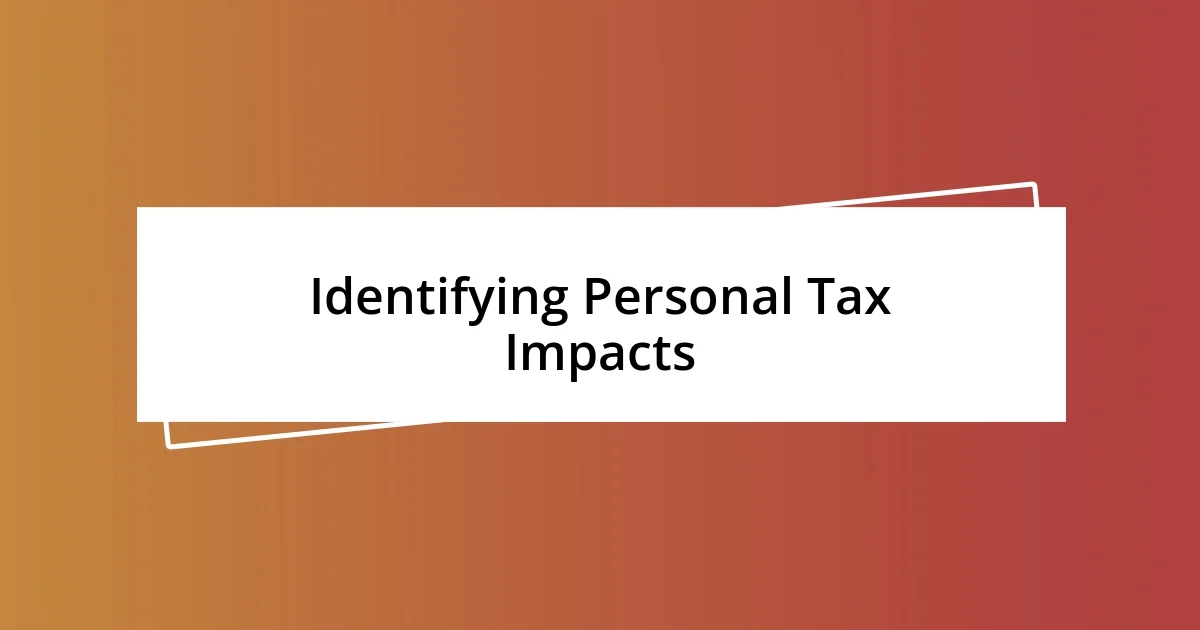
Identifying Personal Tax Impacts
Identifying how tax changes personally affect you is crucial. I remember sitting down with my tax documents and wondering how the adjustments would influence my overall financial picture. The realization hit me: even seemingly minor alterations could lead to significant differences in what I owed or refunded. Understanding this made me more proactive in reviewing my income sources, deductions, and potential credits I might qualify for.
To pinpoint these impacts effectively, I started breaking things down into manageable pieces, which helped clarify the picture:
- Evaluate income adjustments: Any new income or salary increase impacts your tax bracket.
- Review deductions: Changes in standard and itemized deductions can significantly impact your filing.
- Consider credits: New tax credits can offset taxes owed and improve your overall tax liability.
- Analyze dependents: The number of dependents claimed can alter your tax situation based on new legislation.
- Seek advice when needed: Consulting a tax professional was incredibly beneficial; they offered insights I hadn’t considered before and made the tax landscape feel less daunting.
By examining these factors closely, I not only identified the immediate effects but also took steps to strategize for the upcoming year, making me feel more empowered and prepared.
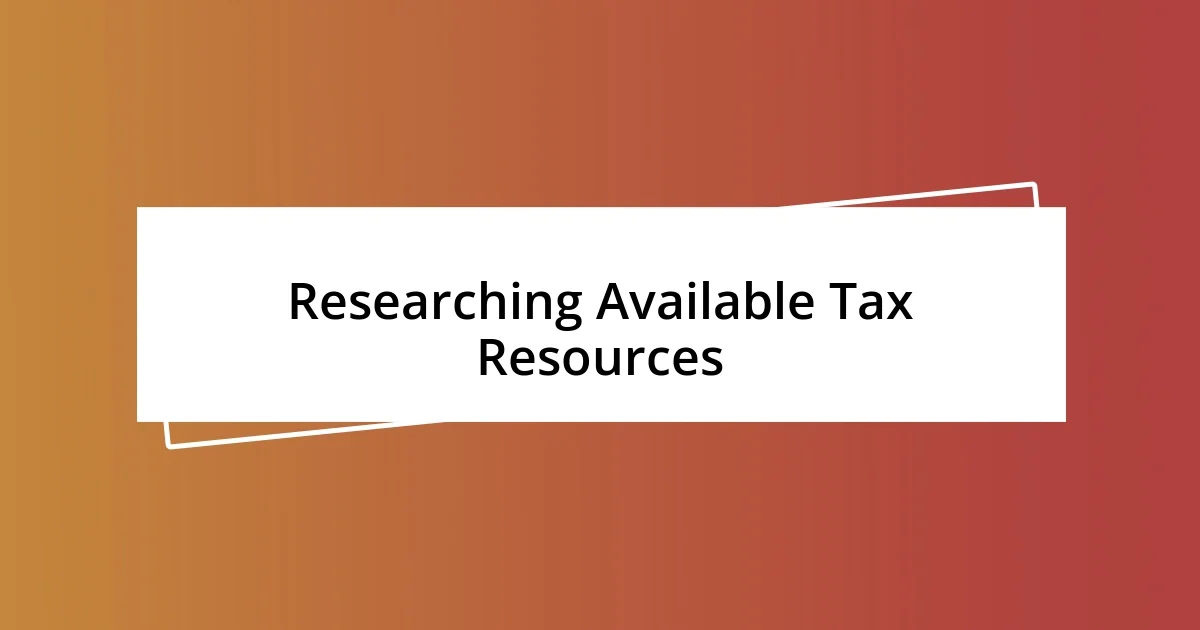
Researching Available Tax Resources
When diving into the world of tax resources, I found that the internet holds a treasure trove of information. Websites like the IRS offer guidelines directly tailored to individual circumstances, while platforms such as TurboTax provide user-friendly tools that break down complex tax concepts. I remember feeling overwhelmed at first, but as I navigated these resources, I discovered that many featured easy-to-follow videos and articles that made understanding my tax obligations much less stressful.
Exploring local community resources also proved invaluable. I stumbled across free tax preparation clinics offered by nonprofits, which not only helped me file my taxes but also educated me about potential deductions I had missed. The personal touch of a local expert explaining things face-to-face provided a level of reassurance I didn’t expect; it felt like a weight had been lifted off my shoulders, knowing I had support within my community.
| Resource Type | Benefits |
|---|---|
| IRS Website | Official guidelines and FAQs |
| TurboTax | User-friendly tools and tutorials |
| Local Nonprofits | Free assistance and personalized advice |
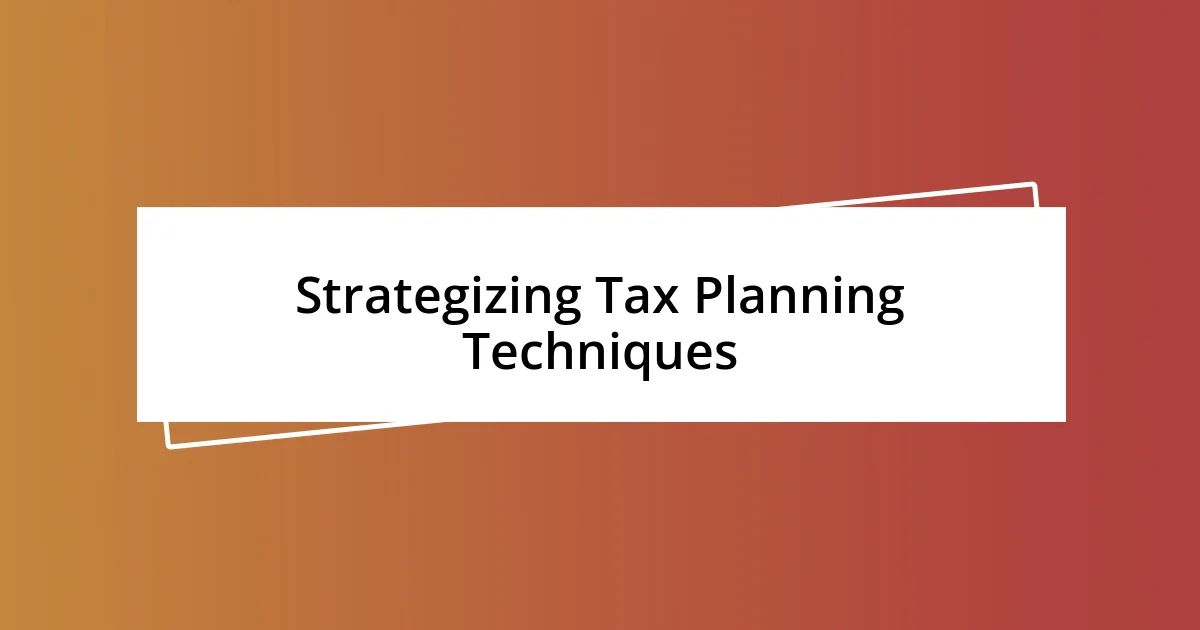
Strategizing Tax Planning Techniques
Strategizing my tax planning techniques became a transformative experience for me. I began by organizing my financial documents early in the year, which felt overwhelming at first. But with each folder I filled, I felt a growing sense of control. Have you ever let deadlines sneak up on you? I certainly had, and now I was determined to be proactive. This approach allowed me to create a clear roadmap, making tax season less like a scramble and more like a well-planned journey.
As I explored various tax strategies, I discovered the importance of timing my income and deductions. For example, I made a conscious decision to defer income into the following year, which shifted my taxable income down. I remember discussing this with a friend, who was astonished when I explained how timing could influence tax brackets. This little tactic not only eased my short-term tax burden but also helped me plan for future expenses with more confidence. Have you ever thought about how simple shifts in timing could lead to significant savings?
Additionally, I took the time to explore retirement contribution limits and utilized them strategically. I found that by maximizing my contributions to accounts like an IRA, I could reduce my taxable income while simultaneously saving for my future. I recall the moment I saw the impact on my tax return—it was empowering. Seeing those figures change with proactive contributions definitely reinforced my conviction that a little planning goes a long way, don’t you agree? These strategies have turned what once felt like a daunting obligation into a streamlined process that I now approach with excitement.
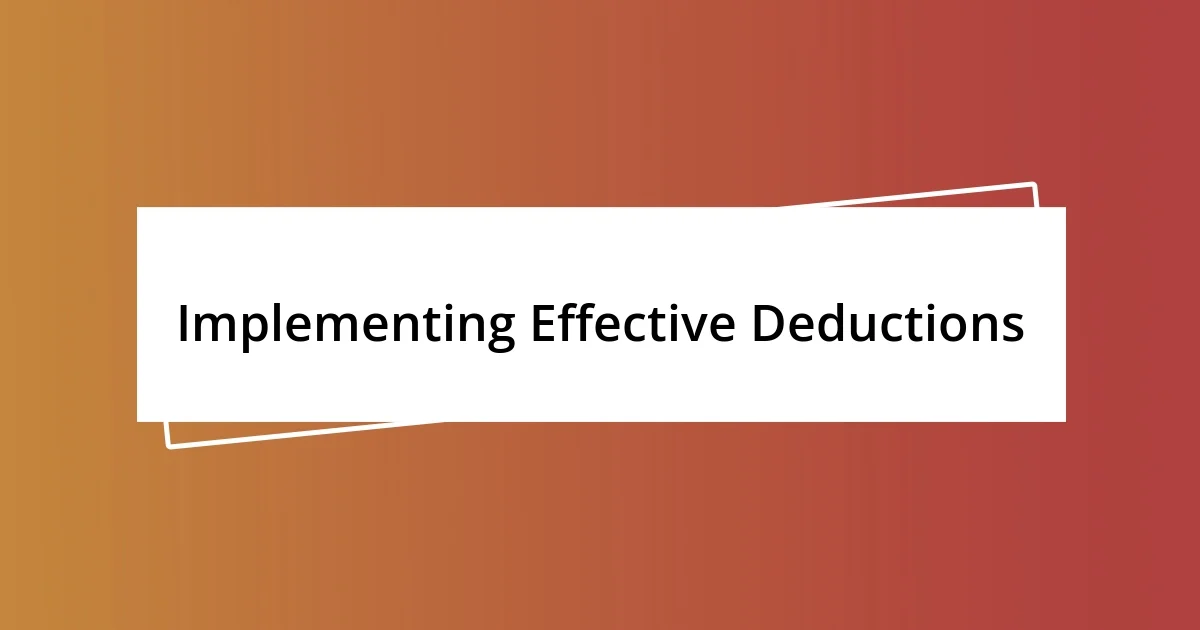
Implementing Effective Deductions
Implementing effective deductions transformed my approach to taxes dramatically. I remember the first time I meticulously reviewed my expenses, and I was amazed to find deductions I hadn’t considered. For instance, I learned that my home office could qualify for a deduction, significantly impacting my taxable income. Have you ever overlooked something so simple that could save you money? It feels incredible to find those hidden gems.
As I delved deeper into deductions, I paid special attention to charitable contributions. I had always donated to my favorite organizations, but tracking those contributions was a game-changer. Each donation not only felt rewarding, but it also lowered my tax burden. I even kept a folder for receipts and a journal detailing my motivations behind each donation. This way, I could feel the emotional connection to my contributions while benefiting financially. It really made me think—just how much good can we do while also helping ourselves?
Moreover, I discovered that medical expenses could significantly lower my taxable income, though they require detailed documentation. I initially felt hesitant about tracking every bill and receipt, but once I started, it became empowering. In a way, it made me more mindful of my health expenses. I remember a particular visit to a specialist that I thought I had to eat the cost on, but after researching, I realized it was deductible. It made me ponder—what other unexpected expenses might be sitting there, waiting for us to reveal their value?
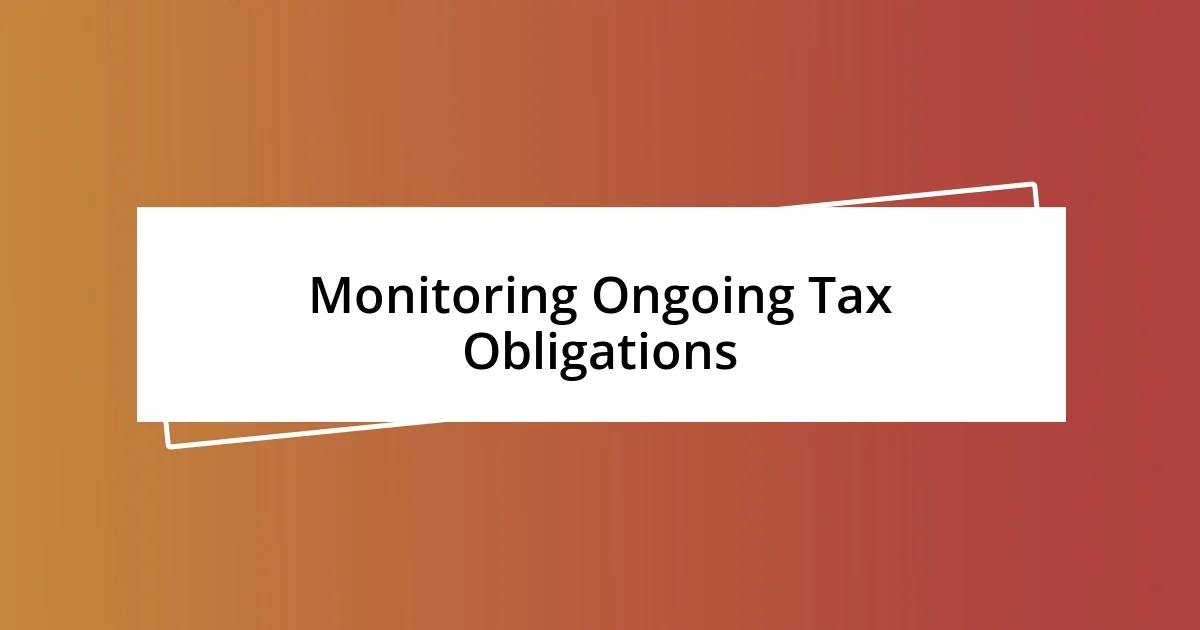
Monitoring Ongoing Tax Obligations
Monitoring my ongoing tax obligations has become a crucial part of my financial routine. I set calendar reminders for key deadlines, which might sound trivial, but this small bite-sized habit has saved me from many last-minute panic sessions. I remember the first time I missed a payment; it felt terrible to deal with penalties. Now, have you ever experienced that stress? I certainly don’t want to go back there, so proactive monitoring has changed everything for me.
I also use financial tracking apps to stay updated on my income and expenses throughout the year. These tools send me notifications when I reach certain thresholds, which helps me adjust as needed. It’s fascinating to see how technology can streamline this process—no more frantic calculations during tax season! Honestly, it feels empowering to have that data at my fingertips. Have you explored how digital tools could optimize your financial tracking?
Moreover, I find that regularly reviewing my tax documents helps me stay aware of possible changes in my financial situation. I’ve learned that life events, like moving or starting a side hustle, can alter my tax responsibilities. Each time I sit down to assess my status, I’m reminded of the fluidity of our financial lives. Reflecting on these shifts is essential. Isn’t it interesting how even small changes can impact our fiscal landscape? I’ve started embracing this fluidity, adapting not just to obligations but to opportunities as well.

Reflecting on My Adaptation Journey
Reflecting on my adaptation journey, I realize how much my mindset has evolved regarding taxes. Initially, I viewed them as a burden, a necessary evil I had to endure. But one day, while flipping through old tax returns, I stumbled upon a mistake that cost me money. It hit me: taxes don’t have to be an endless cycle of anxiety. They could be a pathway to better financial health if I approached them with curiosity instead of dread. Have you ever flipped that switch in your mind?
As I navigated this transformation, I found myself questioning not just the mechanics of taxes, but my overall relationship with money. For instance, when I started budgeting my expected tax payments monthly, it felt liberating. It wasn’t just a gloomy obligation creeping up on me; it became a proactive effort. I remember how satisfying it felt to see those savings accumulate. Have you ever experienced a moment where a small shift makes a big impact? Those little victories made each tax season feel less daunting.
Through this journey, I’ve also come to realize that adaptation is about embracing uncertainty. Adapting to changes in tax laws felt overwhelming at first, but gradually, I learned to see these changes as opportunities for growth rather than obstacles. I recall a tax reform last year that initially intimidated me, but by researching and seeking advice, I uncovered potential savings I never knew existed. That moment of discovery—realizing that I could turn confusion into clarity—was incredibly empowering. Isn’t it fascinating how discomfort can lead us to valuable insights?












